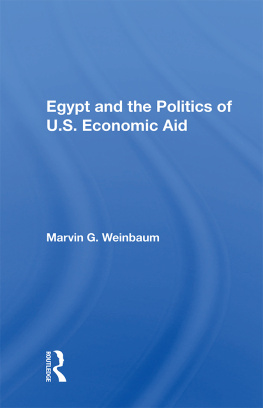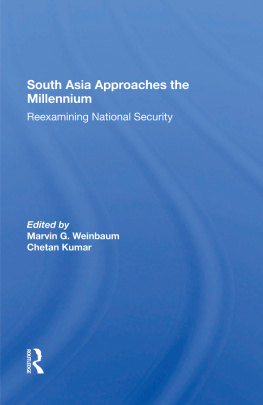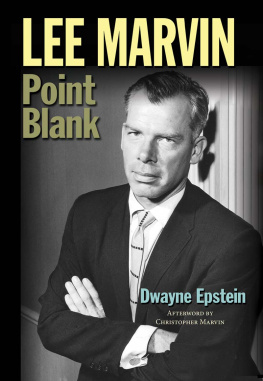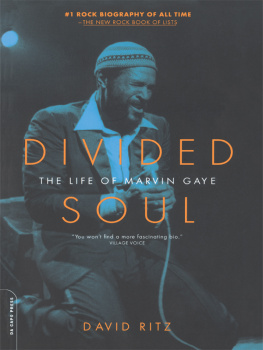Egypt and the Politics of U.S. Economic Aid
About the Book and Author
The massive U.S. economic aid program for Egypt initiated in 1975 resulted in a bilateral aid relationship shaped by the interaction of political and development goals. In this study of the program's origins and consequences, Professor Weinbaum describes its scope and identifies the constraints that delayed and limited program implementation. The author discusses the modest U.S. leverage designed to encourage economic reforms and argues that far-reaching reforms could only be attained through a major change in Egypt's political structure. He finds that, despite its failure to make Egypt more economically self-reliant, U.S. assistance has enabled the country to attain a level of consumption and development planning possible with no other alternative. The profit to the United States results from the regime's moderate foreign policies and compatible views on strategic threats to the region. Despite the mutual benefits of this aid program, Professor Weinbaum concludes that the United States must display greater sensitivity to Egypt's political and economic problems if the "special relationship" is to survive through the 1980s.
Marvin G. Weinbaum is director of the program in South and West Asian Studies and professor of political science at the University of Illinois, Urbana-Champaign, His most recent book is Food, Development, and Politics in the Middle East (Westview, 1982).
For Peter, Meg, and Ted
Egypt and the Politics of U.S. Economic Aid
Marvin G. Weinbaum
First published 1986 by Westview Press, Inc.
Published 2018 by Routledge
52 Vanderbilt Avenue, New York, NY 10017
2 Park Square, Milton Park, Abingdon, Oxon OX14 4RN
Routledge is an imprint of the Taylor & Francis Group, an informa business
Copyright 1986 Taylor & Francis
All rights reserved. No part of this book may be reprinted or reproduced or utilised in any form or by any electronic, mechanical, or other means, now known or hereafter invented, including photocopying and recording, or in any information storage or retrieval system, without permission in writing from the publishers.
Notice:
Product or corporate names may be trademarks or registered trademarks, and are used only for identification and explanation without intent to infringe.
Library of Congress Cataloging-in-Publication Data
Weinbaum, Marvin G., 1935
Egypt and the politics of U.S. economic aid.
(Westview special studies on the Middle East)
Bibliography: p.
Includes index.
1. Economic assistance, AmericanEgypt. 2. Egypt
Foreign relationsUnited States. 3. United States
Foreign relationsEgypt. 4. EgyptEconomic policy.
I. Title. II. Series.
HC830.W45 1986 338.91'73'062 86-1662
ISBN 13: 978-0-367-00578-8 (hbk)
The research for this book was made possible by a Fulbright research grant that enabled me to study in Egypt in 1981-82. Subsequent travel awards by the Research Board of the University of Illinois at Urbana-Champaign were also invaluable. I profited greatly from my discussions with faculty members in the Political Science Department at Cairo University, where I was affiliated. I particularly wish to acknowledge the valued comments of Hassan Nafaar, Abdul Al-Mashat, Mustafar Kamel, and Ali Dessouki, Although we did not always agree, their informed views challenged me to strengthen my arguments. I must thank Professors Gouda Abdel-Khalek, Heba Handussa, Galal Amin, Tim Sullivan, and Elias Tuma at the American University in Cairo for sharing their thoughts about the Egyptian economy and contemporary politics. The observations, in part based on personal experiences with the U.S. aid program, of Andy Korvall of Catholic Relief Services, Ronald Wolf of AMIDEAST, and Michael Albin with the Library of Congress were highly instructive and insightful.
I also interviewed many Egyptians, mainly ministry officials and journalists, in connection with this study, and although I have chosen not to identify them directly, they helped to shape many of my conclusions about the bilateral aid relationship. Most of all, I am indebted to the several members of the AID mission in Cairo who were able to stand back from their activities and take a hard, often scholarly look at their own agency. Although none is responsible for any errors of fact or judgment, John Blackton, Owen Cylke, Graham Kerr, Ray Fort, Vann McKutchen, Bob Mitchell, Frank Moore, John Roberts, Bill Rucker, and Jerry Zarr, among others, contributed greatly to the final product. Nancy Cylke and Silvia Mitchell, who at different times headed the mission's Information Center, were untiring in their efforts to help me collect data and were always good company during the long hours I pored over materials in their reading room. My research was also facilitated by the staff of the American Educational Commission in Cairo. Their professionalism in helping me and my family adjust to life in Cairo and their timely introductions went a long way toward enabling me to complete my work. The several papers and articles that have preceded this book have elicited useful comments from readers. Although most of these critiques are anonymous, I can gratefully acknowledge the comments and corrections in one article by former ambassador to Egypt Hermann Eilts and former AID director in Cairo Don Brown. The sound advice of my editors at Westview Press, Kathy Streckfus and Janice Murray, must also be acknowledged. At Illinois the endurance and word processing skills of Eileen Yoder and Stephany Howard have been critical to this enterprise.
I also want to thank my wife, Francine, who, as an informal editor and travel companion, helped to form many of my thoughts about U.S.-Egyptian relations and to express them on these pages. And to my children, Peter, Meg, and Ted, to whom this book is dedicated, my appreciation is long overdue for their forbearance of a father who has so often over the years asked them to leave behind friends and school for another year abroad.
Marvin G. Weinbaum
Western democratic models and accompanying strategies for economic growth and development were traditionally carried to the Middle East by elites who came into direct contact with the governments and economic systems in the West. Formal education and travel provided the inspiration and examples for leaders of government and business who succeeded in importing institutions and ideas to their countries, usually to see them superficially implanted and disappointingly practiced. Later, whole cultures became exposed to Western aspirations and values through the reach of the electronic media. Although this penetration has unalterably changed these societies, events in the Middle East have also made us acutely aware of the potentially adverse popular reactions to aspects of Westernization that threaten earlier authority patterns and values and leave unfulfilled high expectations. A more subtle pressure steering domestic policies and processes toward Western concepts of development is the activity of foreign consultants, technicians, and other resident advisors. The vehicle for much of this influence and direction is foreign aid programs, whose valued resources can provide strong incentives for liberalizing economies and inducing political changes.
Foreign aid is sought by policymakers in low-income countries in the Middle East as elsewhere in the belief that external support is necessary to overcome the constraints of insufficient capital investment resulting from limited savings and foreign exchange. The resource gap, as it is called, is to be filled by financial and technological assistance that creates the conditions needed for self-sustaining economic growth. Profound economic problems predictably force a lengthy gestation period prior to any "takeoff." Yet, with a reliable flow of foreign aid to guide and stimulate a country's own efforts and to encourage an appropriate domestic environment, economic growth and productivity are expected to register short-term improvement that affects the lives of most citizens. Not incidentally, the initiative and released enterprise of an expanded private sector is presumed by most Western economistsand by many in the developing countries as wellto provide an unrivaled means of spurring economic growth. The gains are, in turn, thought to promote political stability and, through this, close ties and favorable attitudes toward the aid donors and their economic systems.







